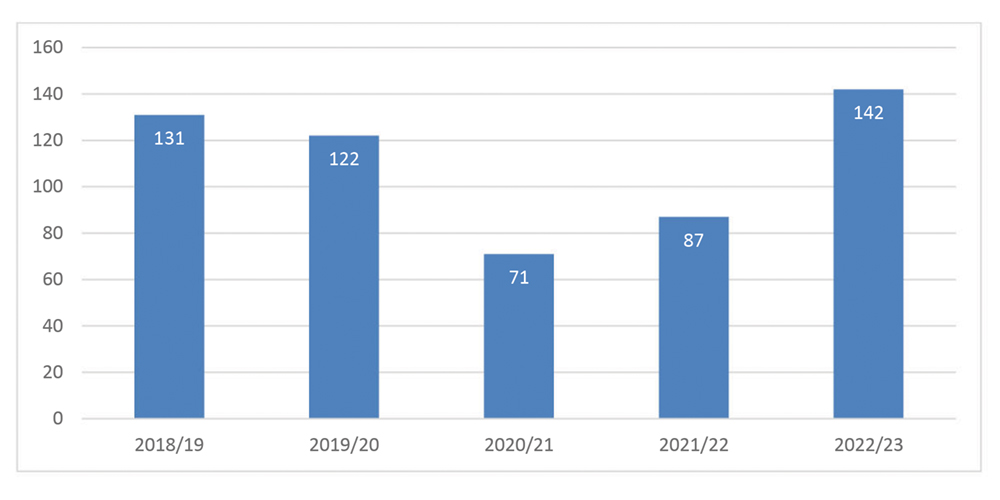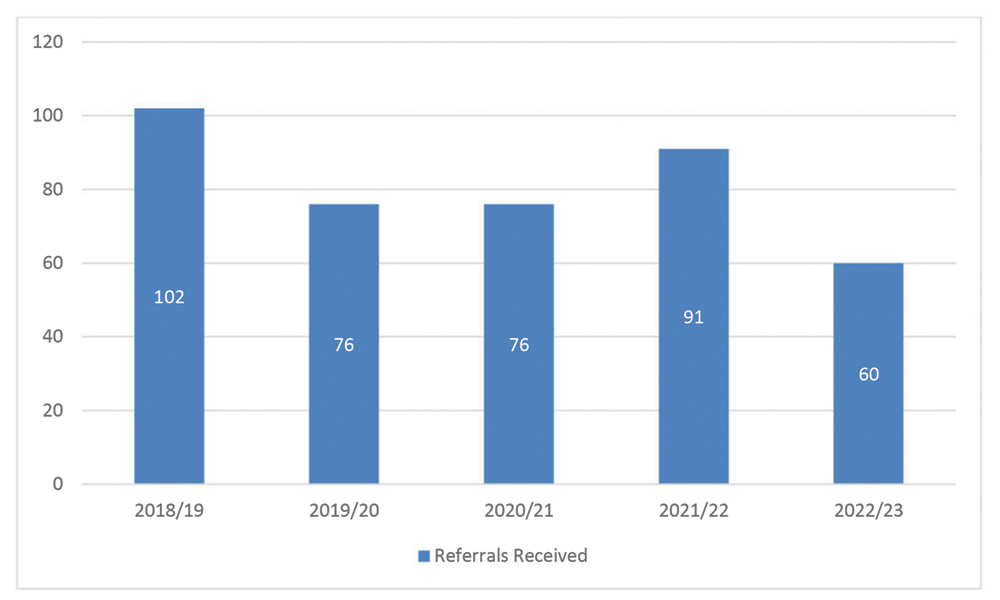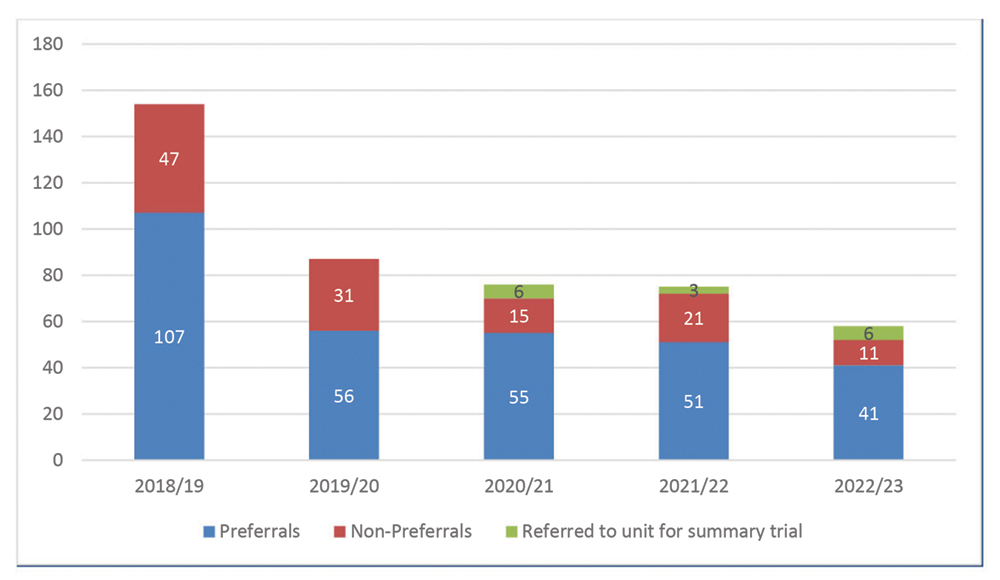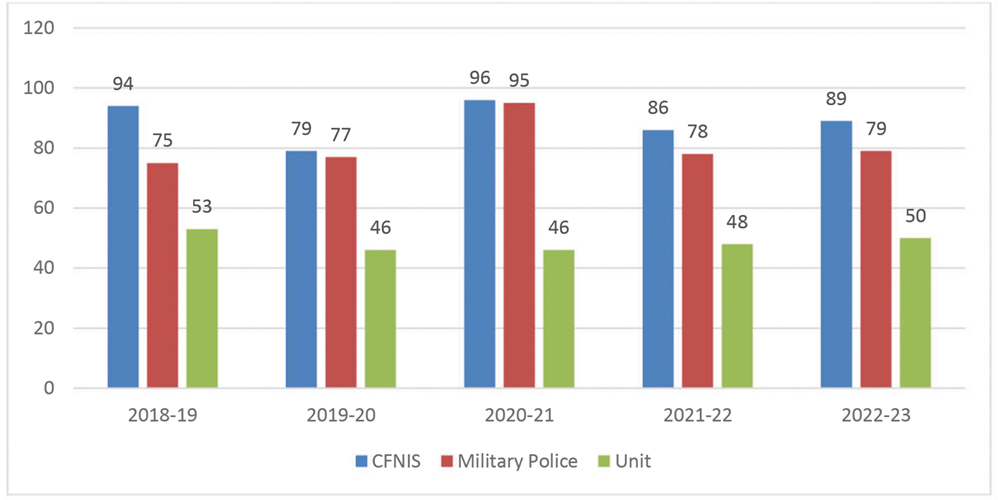Chapter 2: Year in Review
2.1. Overview
19. The CMPS received 60 new referrals during the reporting period and completed a total of 41 courts martial. The CMPS also completed 142 requests for pre-charge advice. Eleven (11) appeals were completed at the Court Martial Appeal Court and one (1) appeal was concluded at the Supreme Court of Canada. There was one (1) custody review hearing during this reporting period (see annex D).
2.2. Evolution of the Military Justice System
20. The implementation of Bill C-77, brought into effect on 20 June 2022, led to significant changes to the military justice system. The enactment of service infractions, dealt with through summary hearings, has had an impact on the number and type of cases referred to courts martial. There is now a much clearer divide between those matters that can be appropriately dealt with at the unit level and those that warrant a court martial. The new system also reduces the post-charge delay, as cases no longer transit through a referral authority. The charge layer now refers charges directly to the DMP.
21. Since charges that were laid before 20 June 2022 continued to operate under the old regime, it is difficult to fully measure the impact of those changes in this reporting period. Since the implementation of Bill C-77, the CMPS now provides pre-investigation advice pursuant to the new requirement contained at QR&O 102.02(2) to all members of the military police and to the CFNIS. Since July 2022, all intake for requests for any type of CMPS legal advice is performed electronically through a centralized e-mailbox. This new process was widely communicated to all military police and CFNIS investigators via their chain of command.
22. Under the new intake process, incoming requests for advice are first reviewed by the DDMP Ops, or a delegate, who either deals with the matter directly, or assigns a prosecutor to handle the request. As with any changes, it took some initial adjustment to get the system implemented. Overall, the new process proved very efficient to handle the large demand for legal services derived from the new additional requirement for pre-investigation advice.
2.3. Case Management System (CMS)
23. CMS tracks the status of files and collects data at the pre-charge, referral, post-charge, pre-trial, and trial stages. All important dates associated with these files are recorded in CMS including, but not limited to, the dates when the file was referred to the DMP, when the file was assigned to a prosecutor, the date of the decision of the prosecutor on whether or not to prefer charges, and key dates in the court martial process. CMS continues to be improved periodically and, most recently, to respond to the changes resulting from the implementation of Bill C-77.
2.4. Files in Numbers
Pre-charge advice
24. CMPS received 148 new requests for pre-charge advice and 7 requests had been pending from the previous reporting period. Of the 155 total requests, 142 pre-charge advice files were completed during this reporting period, leaving 13 files still pending at the end of the current reporting period.
25. The following chart shows the number of completed pre-charge requests for the last five reporting periods:

Graph breakdown: Number of completed pre-charge requests for the last five reporting periods
| 2018/19 | 2019/20 | 2020/21 | 2021/22 | 2022/23 |
|---|---|---|---|---|
| 131 | 122 | 71 | 87 | 142 |
Number of referrals received during the reporting period
26. During this reporting period the DMP received 60 new referrals. In previous years, this report also included the number of files carried over from the previous reporting period. This figure has been removed from this report as the methodology for categorizing files as having been carried over did not appear to have been consistent from year to year.
27. The following chart shows the number of new referrals received by CMPS for the past five reporting periods:

Graph breakdown: Number of new referrals received by CMPS for the past five reporting periods
| 2018/19 | 2019/20 | 2020/21 | 2021/22 | 2022/23 |
|---|---|---|---|---|
| 102 | 76 | 76 | 91 | 60 |
28. During this reporting period, prosecutors made post-charge decisions in 58 files. Twelve (12) of those decisions were made on files received during the previous reporting period. From the 60 referrals received this year, 14 files were still pending a prosecutorial decision at the end of this reporting period.
29. Of the 58 post-charge reviews completed this reporting period, prosecutors preferred at least one charge in 41 files. Eleven (11) files were not preferred and six (6) files were referred back to a unit to try the accused person by summary trial. The preferral rate for this reporting period is therefore 71%.
30. The next figure shows the number of preferrals, non-preferrals and referral of charges to the unit for summary trial for the past five reporting periods:

Graph breakdown: Number of preferrals, non-preferrals and referral of charges to the unit for summary trial for the past five reporting periods
| 2018/19 | 2019/20 | 2020/21 | 2021/22 | 2022/23 | |
|---|---|---|---|---|---|
| Referral to unit for summary trial | 0 | 0 | 6 | 3 | 6 |
| Non-Preferrals | 47 | 31 | 15 | 21 | 11 |
| Preferrals | 107 | 56 | 55 | 51 | 41 |
Preferral rates by investigative agency
31. The incident giving rise to the charge(s) may be investigated by one of three military investigative agencies: the CFNIS, an investigator with the military police who is not a member of the CFNIS, or a unit investigator. The rate of preferrals varies between investigative agencies as their investigators have different levels of experience, proficiency and training.
32. During this reporting period, the preferral rates were as follows:
- Files investigated by the CFNIS: 89%;
- Files investigated by the regular military police: 79%;
- Files investigated by a unit investigator: 50%.
33. Following the implementation of Bill C-77, it is expected that all new service offence investigations will be conducted by the CFNIS or the military police. This flows directly from the clearer divide that now exists between those matters that can be appropriately dealt with at the unit level and those that warrant a court martial. While the military police may investigate service infractions in certain circumstances,Footnote 3 it should be extremely rare for a unit investigation to lead to the laying of service offence charges. If the allegation is serious enough to potentially warrant a court martial, then it should be investigated by a professionally trained police investigator.
34. The next figure provides an overview of preferral rates by investigative agency over the past five reporting periods:

Graph breakdown: Preferral rates by investigative agency over the past five reporting periods
| 2018/19 | 2019/20 | 2020/21 | 2021/22 | 2022/23 | |
|---|---|---|---|---|---|
| CFNIS | 94 | 79 | 96 | 86 | 89 |
| Military Police | 75 | 77 | 95 | 78 | 79 |
| Unit | 53 | 46 | 46 | 48 | 50 |
Completed Courts Martial
35. This section provides an overview and analysis of cases heard at a court martial during the reporting period. For a complete list of all courts martial heard during the reporting period, please refer to Annex A.
36. A total of 41 courts martial were completed during this reporting period. Of those, 30 were Standing Courts Martial and 11 were General Courts Martial.
37. The next figure illustrates the number of completed courts martial by type for the last five reporting periods:

Graph breakdown: Number of completed courts martial by type for the last five reporting periods
| 2018/19 | 2019/20 | 2020/21 | 2021/22 | 2022/23 | |
|---|---|---|---|---|---|
| General Court Martial | 6 | 10 | 7 | 12 | 11 |
| Standing Court Martial | 45 | 45 | 27 | 36 | 30 |
2.5. Court Martial Cases
38. Please refer to Annex A for an overview of all the courts martial held during this reporting period.
2.6. Notable Appeals
39. For the complete list of the cases completed at the CMAC throughout the year, please consult Annex B. For the list of SCC cases, please consult Annex C.
R v McGregor, 2023 SCC 4
40. At his SCM (R v McGregor, 2019 CM 4015), Cpl McGregor was found guilty of sexual assault pursuant to s. 130 of the NDA (contrary to s. 271 of the Criminal Code); two counts of voyeurism pursuant to s. 130 of the NDA (contrary to s. 162(1) of the Criminal Code); one count of possession of a device for surreptitious interception of private communications pursuant to s. 130 of the NDA (contrary to s. 191(1) of the Criminal Code); one count of cruel or disgraceful conduct, pursuant to s. 93 of the NDA; and one count of conduct to the prejudice of good order and discipline, pursuant to s. 129 of the NDA. He was sentenced to imprisonment for a period of 36 months and dismissal with disgrace from His Majesty’s service (R v McGregor, 2019 CM 4016).
41. The case arose from a criminal investigation conducted by the CFNIS in the Commonwealth of Virginia in the United States. Cpl McGregor was a regular force CAF member posted to Washington, D.C. Following a complaint to the CFNIS by another CAF member who found two audio recording devices in her home and who believed were placed there by Cpl McGregor, the CFNIS commenced an investigation. After obtaining a search warrant with assistance of local authorities in Virginia, the CFNIS executed the warrant on Cpl McGregor’s residence. While searching electronic devices which were authorized in the search warrant, investigators found unanticipated digital evidence of sexual assault.
42. At court martial, Cpl McGregor unsuccessfully brought a motion to exclude the relevant evidence under s. 24(2) of the Charter, arguing the Charter applied extraterritorially. The military judge’s decision relating to both the extraterritoriality of the Charter and the reasonableness of the search was affirmed by the CMAC (R v McGregor, 2020 CMAC 8) and the appeal was dismissed on 31 December 2020.
43. Cpl McGregor sought leave to appeal at the SCC. Leave was granted on 14 October 2021. The appeal was heard at the SCC on 16 May 2022 and judgement was rendered on 17 February 2023.
44. The SCC found that the warrant was authorized and properly executed. Given the limited reach of Canadian law in a foreign country, the investigators communicated with local authorities and availed themselves of the only legal mechanism by which to obtain a proper search warrant. In terms of the reasonableness of the search, the Court rejected Cpl McGregor’s argument that the search was more intrusive than necessary and was unjustifiably expanded to include a search outside the scope of the warrant. The majority of the Court found that the requirements for application of the plain view doctrine were met, and that the evidence of sexual assault discovered inadvertently by the investigators did not invalidate the warrant. The SCC declined to reconsider the extraterritorial application of the Charter and found that the Charter generally cannot apply to Canadian authorities in investigations abroad (as set out in R v Hape, 2007 SCC 26).
45. The SCC dismissed the appeal and affirmed the decisions made at court martial and the CMAC.
R v Edwards et al., SCC files 39820; 39822; 40046; 40065; 40103
46. A long-disputed series of court martial cases pertaining to the independence and impartiality of military tribunals under s. 11(d) of the Charter will soon have judgment rendered by the SCC.
47. On 1 June 2021, the CMAC ordered new trials for these cases. In doing so, the CMAC confirmed that military judges are subject to the Code of Service Discipline, that the Military Judges Inquiry Committee has no power to discipline, and that the prosecution of military judges before courts martial is consistent with the rule of law principle that no one is above the law.
48. The accused in Edwards et al. sought leave to appeal to the SCC. Leave was granted on 2 February 2023. The core issue raised by the Appellants was whether the status of military judges as military officers violates s. 11(d) of the Charter. The SCC hearing was conducted on 16 October 2023. Judgement was reserved.
49. R v Cookson (SCC file 40845), R v Remington (SCC file 40642) and R v Turner (SCC file 40779) all raise the same issues and are all pending a decision for leave to appeal by the SCC.